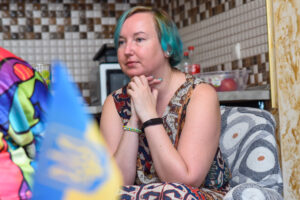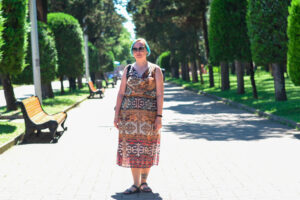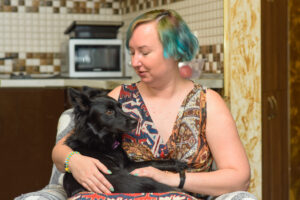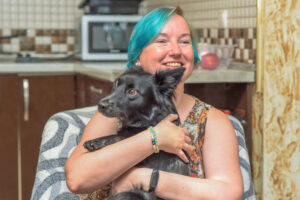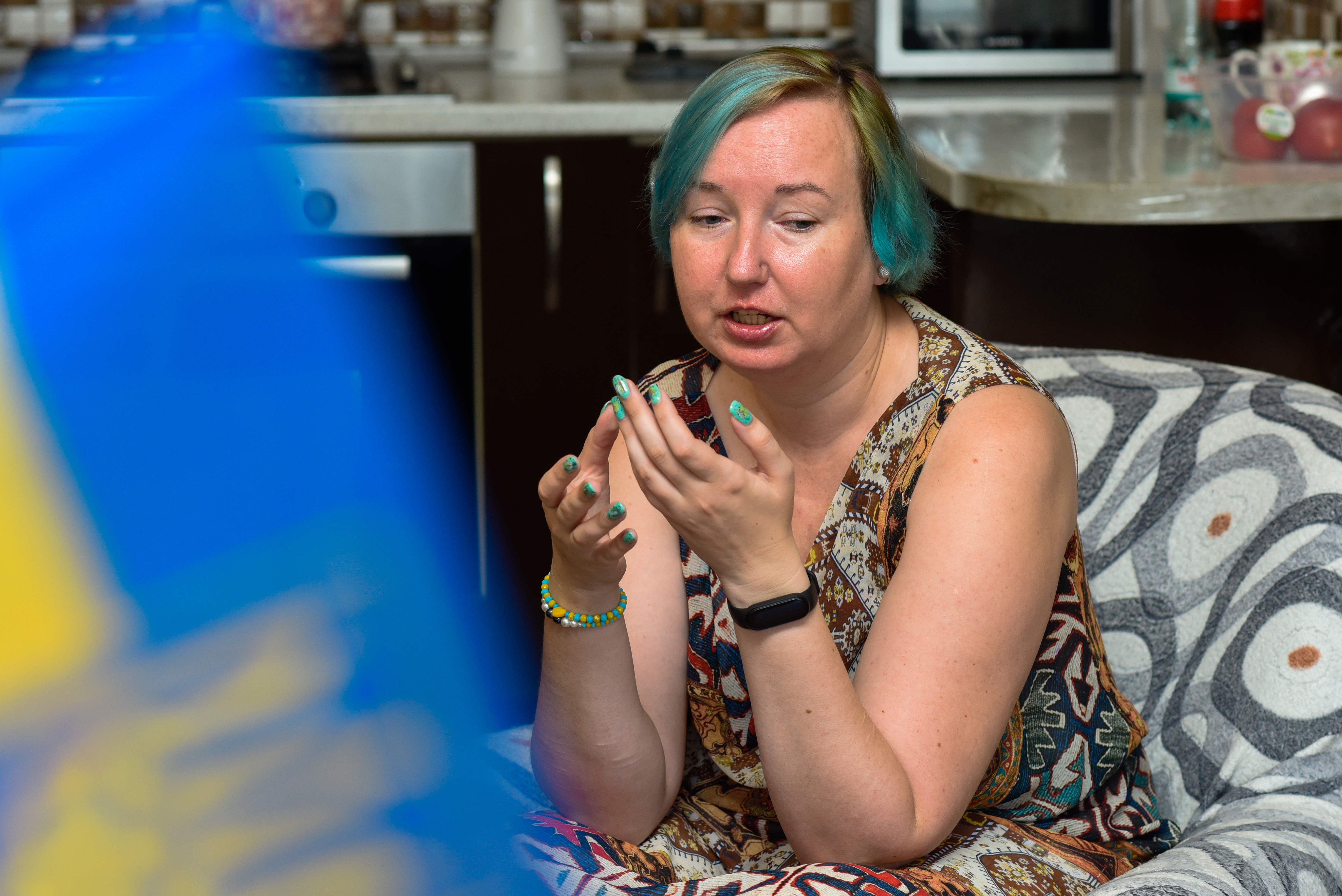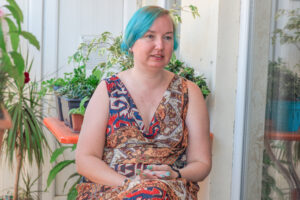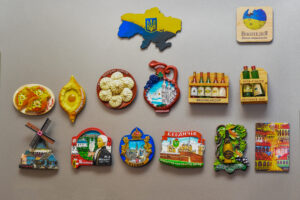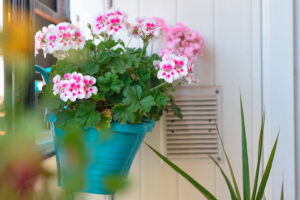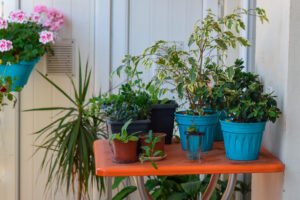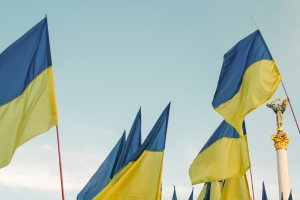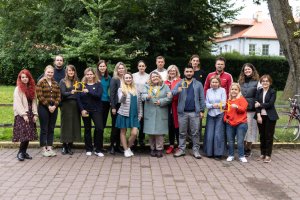
‘We feel at home in Georgia’ — a Ukrainian activist’s new life in Batumi
Olena Vinsent was born in Simferopol, in the Crimean Peninsula. A few years later she moved to Krasnoperekopsk – a Crimean town near Kherson. In 2014, her home found itself on the Russian side of the annexation, and she moved to Lviv, where she spent five years, then from Lviv to Kramatorsk, before returning home to her mother’s in Krasnoperekopsk in 2019 due to health-related issues and financial difficulties, though she would often cross the demarcation line to Kherson for NGO activities and medical treatment. That’s where she was in February 2022, when Russia started another war, swiftly occupying the Kherson region within the first few days. Olena’s home found itself on the front line and it became more dangerous than ever to stay, especially given her prominence as an activist and human rights defender, which made her a target for the invaders.
“I became an activist only in 2014. I am an artist and used to paint on souvenirs. I went into activism after the Russian invasion. This field was always close to me, and I found myself defending human rights and working in support of displaced people,” Olena explains.
She is a co-founder of the NGO ‘Promin Zmin’ and ‘Between Us’, and a member of ‘Fight for Rights’. She has experience in working on LGBT rights, and on the mental health problems of people with disabilities.
Despite additional questions, she does not speak much about this topic. She gives only the briefest information about moving from one town to another because of the Russian invasion, and it is obvious that she is trying to keep her emotions under control.
“It was impossible to just live and continue civil activities, and I left,” she says of her reasons for leaving Crimea, and emotions interrupt her speech.
Run away for survival
After a short break, we continue the conversation with a hard topic – the full-scale February war. On the first day, 24 February, she was in Kherson, in the hospital near which the Russians positioned their checkpoints and restricted travel to other parts of the city. She was unable to leave the hospital until 12 March.
Large-scale demonstrations against the military occupation were taking place in Kherson at that time. Olena attended them. We asked her about the planning, and whether people were scared or not.
“Demonstrations in Kherson were organised spontaneously. People were not so much scared, as… simply, this is the nature of Ukrainians. We are always ready to fight.”
Human rights defenders and activists are at particular risk under military occupation. There is clear evidence that in the areas controlled by Russia, soldiers have detained, tortured, and killed members of civil society without any reason.
“When I tried to leave Kherson for the first time, we passed through 70 checkpoints and the Russians sent us back. They told us it was useless to try to leave until 11 May, as all “borders” would be closed.
After this I went to my mother in Crimea and waited there for 11 May. When the day came, I went to Lviv by car. I had to stay there for 2 months to obtain documents for a disabled person, and it took time. Then I returned to Crimea, I took my mother, the dog and 3 cats, and we went to Georgia,” Olena recalls.
“We decided on Georgia because it felt easier in terms of accommodation and because I had problems with my joints – now it’s the first year that nothing hurts because of the climate – but in Georgia, we had no friends, no contacts,” she says.
But the way to Georgia was not safe. They travelled by car because of their pets and had no choice but to drive through Russia. At the Russian checkpoints, soldiers with assault rifles stood at her back and ordered her to clear the password on her phone. It was meaningless to argue, she handed the phone and the Russian soldiers looked for everything related to Ukraine.
“At one of the checkpoints they threatened to riddle us with bullets. They stopped us because one of the travellers had the document of a disabled person but did not have a military card. They made a fuss about this, and ordered us to take our suitcases from the car. Then another car stopped behind us which the Russians found more interesting and left us alone. We threw our belongings back into the car and left,” Olena recalled, taking a deep breath.
“I felt fear and uncertainty. We had no mobile connection, it’s a grey zone and if you get into trouble there, nobody will know.”
Support to start a new life
When Olena and her mother first thought about moving to Georgia, she was not expecting help from anybody. But when she told her friends about her plans, they connected her with supporting organisations – initially the Human Rights House Crimea (HRHC) office, then – HRH Tbilisi office.
HRHC and HRHT help Ukrainian civil society members and journalists under the EU-funded project Emergency Support Ukraine (ESU). In 2022 the Crimea office funded Olena’s and her mother’s travel to Georgia thanks to the protection programme, funded by the Norwegian Ministry of Foreign Affairs, while the Human Rights House Tbilisi provided them with accommodation.
“We offer financial support to human rights defenders to cover accommodation and lodging costs. We also provide psycho-social support that is very often needed due to professional burnout and going through various hardships related to the human rights defenders’ work. We also offer legal support and consulting, if needed, e.g., to get a residence permit,” explains Natia Tavberidze, Human Rights House Tbilisi coordinator.
Emergency Support Ukraine (ESU) is a regional project that provides opportunities for emergency support for Ukrainian civil society and independent media in the wake of the full-scale Russian invasion. ESU is funded by the European Union and implemented by an ERIM-led coalition of partners including the Human Rights House Foundation and Human Rights House Tbilisi.
With EU support, the Human Rights House Tbilisi has already supported 19 human rights defenders and their five family members, in total 24 beneficiaries, under this project.
New home in Batumi
After crossing the Russian border, Olena and her mother headed to Batumi.
Their new home is located in a high-rise building, one of the suburbs of the town by the sea. Olena and her mother live there with their dog Lira, and their three cats.
“At first, we rented accommodation daily but then found a flat within three days. It was next door to our current home. We rented it for six months.
“I thought it would be a problem to rent the flat with four pets but on the contrary, when the landlord learned that I brought the dog from Ukraine, he gave me a carpet for the dog. We were very lucky to move to the next-door house, as we were already used to the neighbours here,” recalls Olena.
She says the situation in Batumi at that time, with numerous Ukrainian flags, posters and inscriptions, Ukrainian songs, and people’s solidarity made her feel at home in a familiar, native environment.
“Georgians met us well. We felt at home. We had no problems at all,” says Olena, and compares her Georgian experience to other countries.
“A few months after arriving to Georgia, I had to travel to Serbia, and I appreciated even more the huge support we have in Georgia. For a week, I didn’t see a single Ukrainian flag in Belgrade.”
She tries to recreate her native environment in her new home. Near the bed she has placed a Ukrainian flag and hair clips in the same colours. On the fridge are magnets from home. Here, you will see the symbols of Crimea, Donetsk, Tbilisi and Batumi, Ukrainian sunflowers and Adjarian khachapuri all together.
“I could not take everything. I brought the few items associated with my home, as since 2014 I had to move to different places 12 or 13 times.”
She is happy when Ukrainian organisations hold events in Batumi, and she has the chance to talk in her native language. She tells me, laughing, that on the first day of every month, visits to the Botanical Garden are free for Ukrainians; there she meets the bus full of Ukrainians, hears Ukrainian everywhere and is incredibly happy.
She has been taking courses in Georgian language for several months. She says, apologetically, that she is not good at languages and that Georgian is no exception.
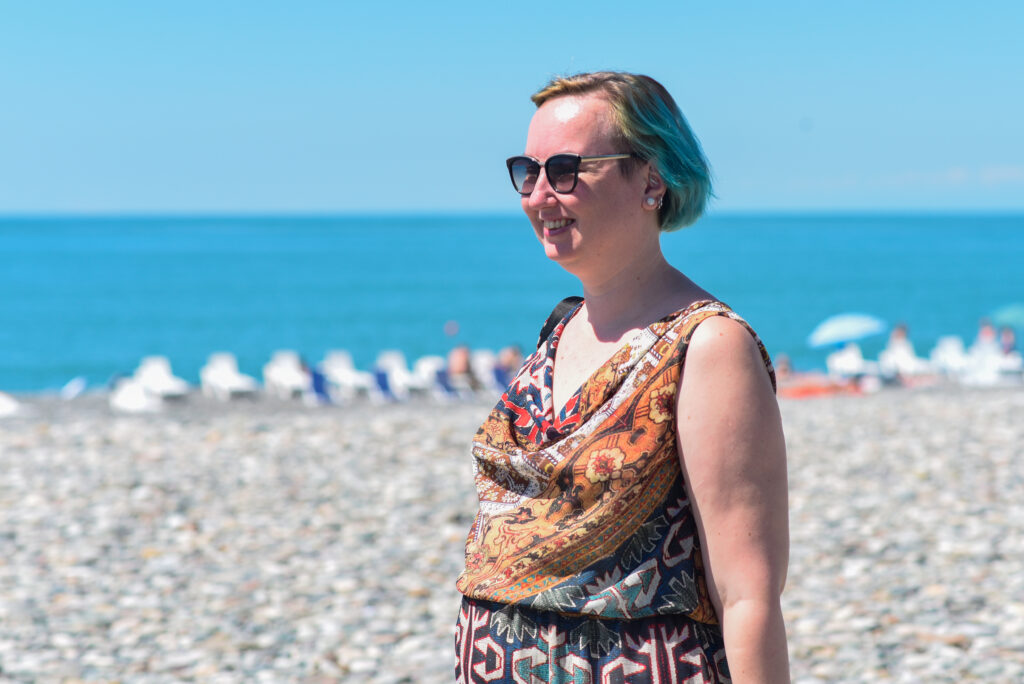
Olena says she feels safe in Batumi and that the fears she had in occupied Crimea have gradually disappeared. The environment and the people’s attitude help her in this.
She likes many places in Batumi, but her favourite space is her home, especially the balcony where she tries to cultivate the plants she had in her garden in Crimea. She has a palm brought from Kherson, which thrives now in the sunny and humid weather of Batumi.
Distance learning and activism
As soon as she arrived in Georgia, Olena started to work for Wikimedia Ukraine, which is looking to find more people who will write reliable information for the Ukrainian Wikipedia.
Apart from that, she works at Mental Health for Ukraine, an organisation supporting the mental health of Ukrainians, where she manages the organisation’s ‘ambassadors’ – people who are ready to talk openly about mental health problems.
Simultaneously, she is taking a distance learning course to get her master’s degree from Donetsk University, which has been evacuated to Vinnytsia since 2014. She is in the first group of future graduates who are studying how to manage the situation on post-conflict territories.
“We expect that after the liberation, specialists like this will be in need. So, now I am preparing my master’s thesis on work with youth on the liberated territories.”
Olena recalls how hard it was at the beginning: “When I left for Georgia, I had nothing at all, I needed everything. I did not expect any help and I had to do everything myself, but I received substantial support here.”
The Human Rights House Tbilisi coordinator, Natia Tavberidze explains, it can be hard for human rights defenders to get help, especially when there is no emergency situation.
“They always compare with the situation of others. The oppression is always different elsewhere. For example, the situation in Belarus may be worse than in Georgia. But for the human rights defender to be strong and to continue his or her activities, it is often necessary to get a certain type of support. At least psycho-social support to prevent burnout. It is often difficult to agree with this, as people think that others need more support than the defenders,” tells Natia.
Looking forward to return
“For now, my house in Crimea is OK, but I don’t know what will happen when the counter-attack starts,” said Olena. “Not only I hope, I know it will happen for sure,” she adds.
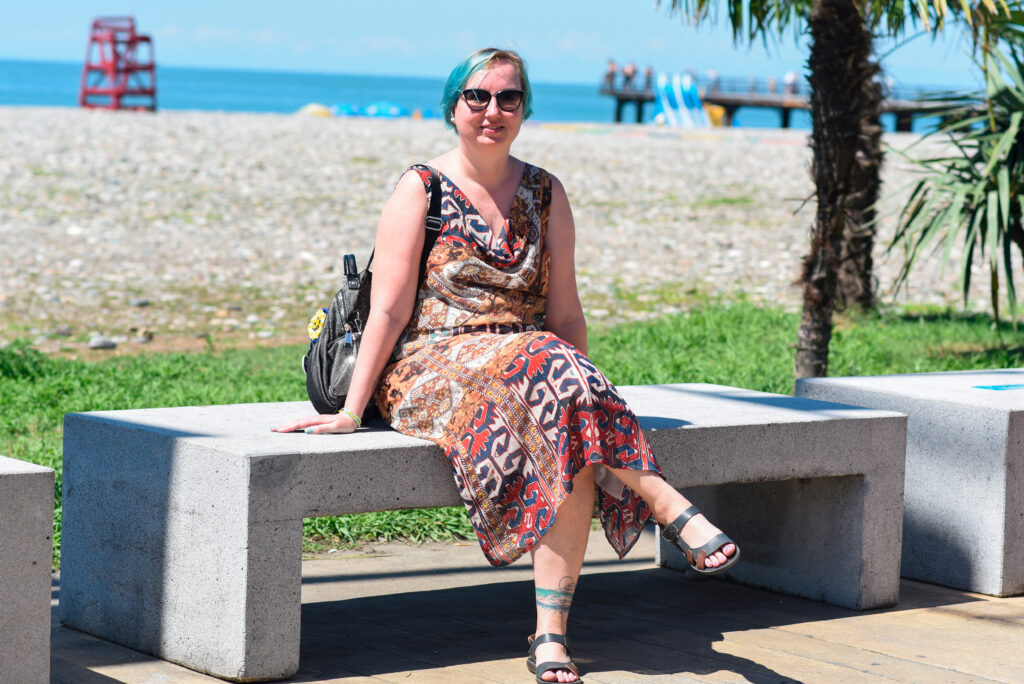
She has rented the flat in Batumi for one year, until April, provided that “if Ukraine wins sooner”, they will immediately return home.
She has also thought about her future occupation after the war. She does not know where she will go – will she have a home or will she have to live in another city?
“I am also ready to return to another place. I will go to the place where I will have a job, but I want to return to my town, of course. There is my house and the big garden, with 70 roses and 90 chrysanthemums.
“I miss my plants most of all. I know that the house might be bombed, but the plants may survive.”
At the end of the interview, we walked along the boulevard and discussed the architecture of Kherson, Lviv and Batumi. Olena points out that in Batumi, the houses have large terraces, balconies, and windows, and this is the main difference. It is quite the opposite in Ukraine, as winters are cold there and people try to maintain heat.
“I like that sometimes it rains in Batumi. I am from a region where it never rains in summer. I have a feeling of freshness when it rains here. So, when people complain about the weather, I am surprised that they come to Batumi,” said Olena.
A couple of days after the interview, Olena plans to travel to Kyiv through Krakow and Katowice – her first return since the beginning of the war, and she regrets that she has only four days for her scheduled working meetings and will not have enough time for anything else. But Olena is not disheartened, she knows she will be back in Ukraine – together with her mother, Lira the dog, and the three cats. Until then, she will continue to fight for her people and her country.
“Since 2014, we have been sure that Ukraine would win. I knew it would not happen soon, but it will happen anyway,” she insists.
Author: Tamuna Gegidze
Article published in Georgian by On.ge
MOST READ
SEE ALSO

‘The Kremlin has entered the chat’: how to protect your personal data on Telegram and avoid the bait of propaganda

No, time is not on Russia‘s side
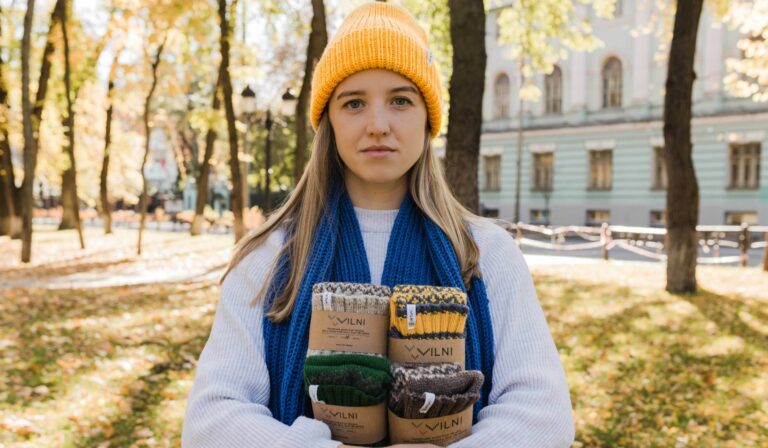
Socks for Peace: how the Vilni project is supporting internally displaced women in Ukraine
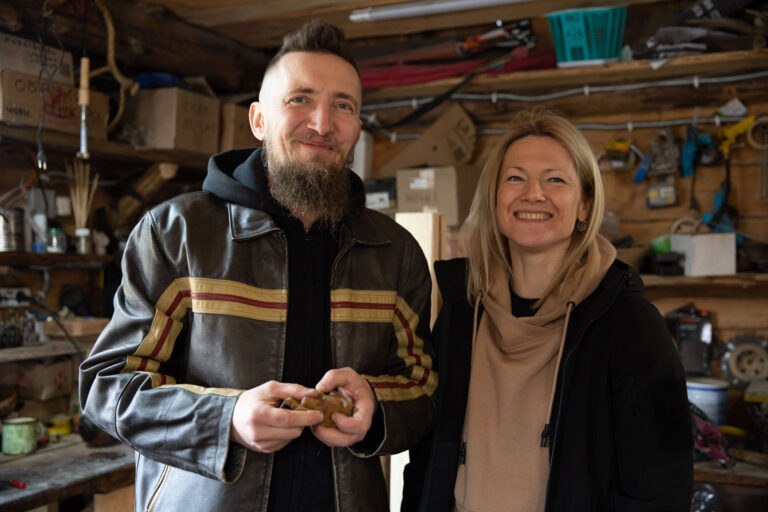
Celebrating traditional Ukrainian cultural identity in Rivne
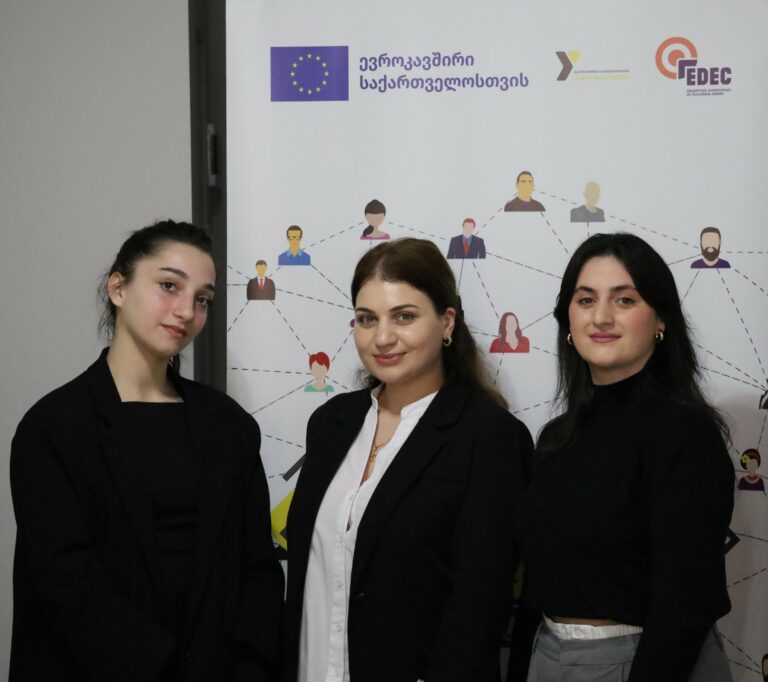
A hands-on approach to boost youth employment in Georgia
More campaign pages:
Interested in the latest news and opportunities?
This website is managed by the EU-funded Regional Communication Programme for the Eastern Neighbourhood ('EU NEIGHBOURS east’), which complements and supports the communication of the Delegations of the European Union in the Eastern partner countries, and works under the guidance of the European Commission’s Directorate-General for Neighbourhood Policy and Enlargement Negotiations, and the European External Action Service. EU NEIGHBOURS east is implemented by a GOPA PACE-led consortium. It is part of the larger Neighbourhood Communication Programme (2020-2024) for the EU's Eastern and Southern Neighbourhood, which also includes 'EU NEIGHBOURS south’ project that runs the EU Neighbours portal.

The information on this site is subject to a Disclaimer and Protection of personal data. © European Union,
